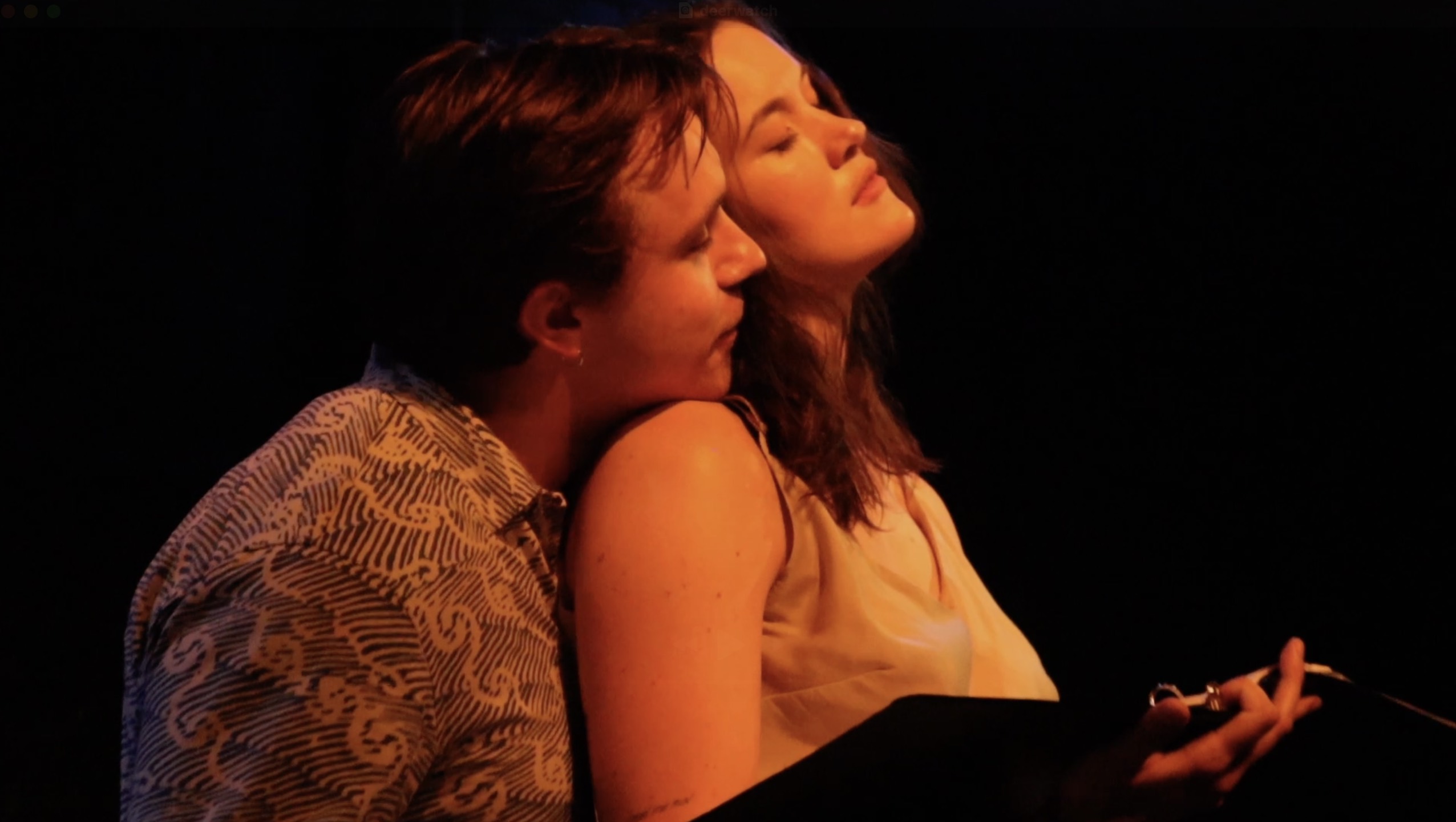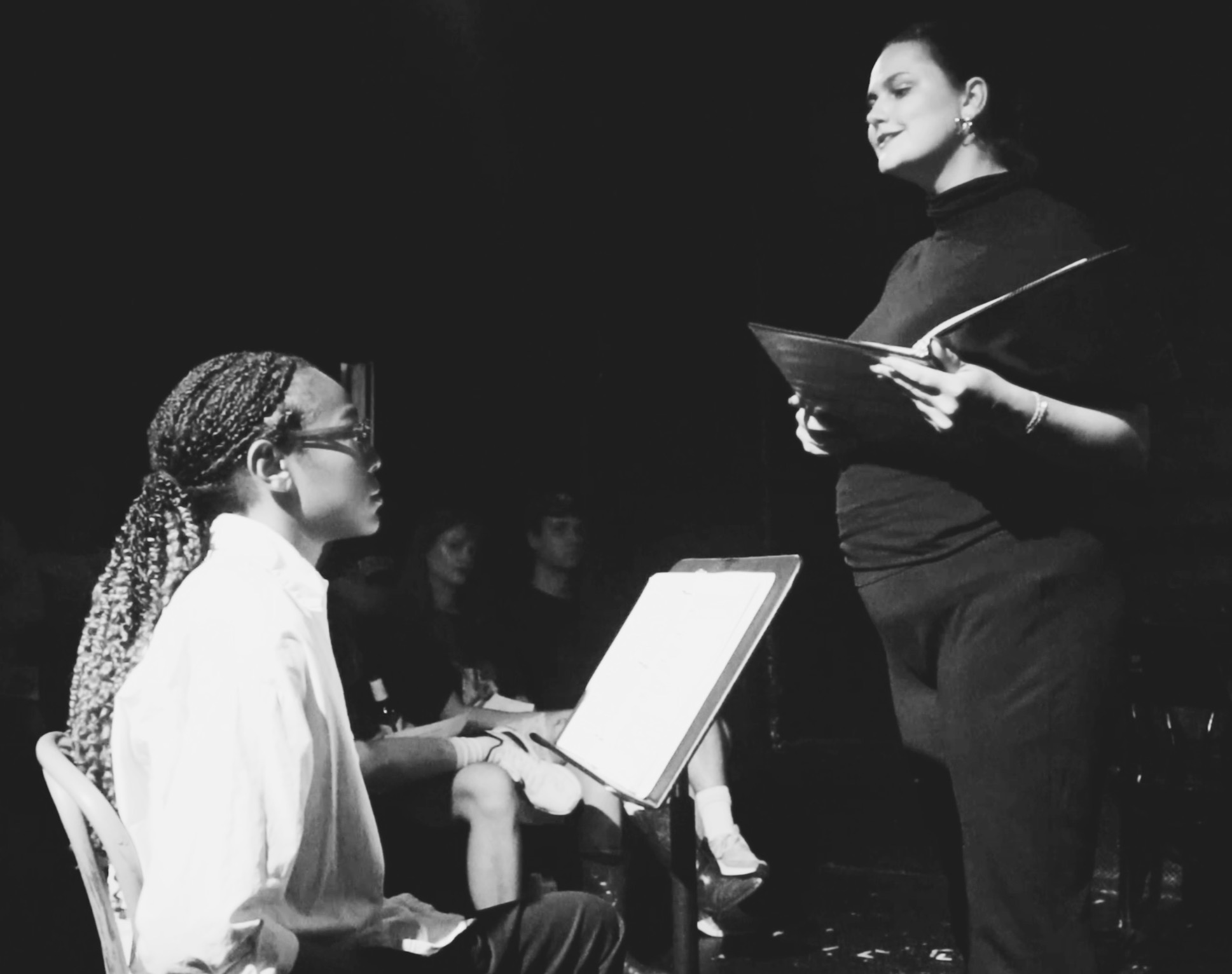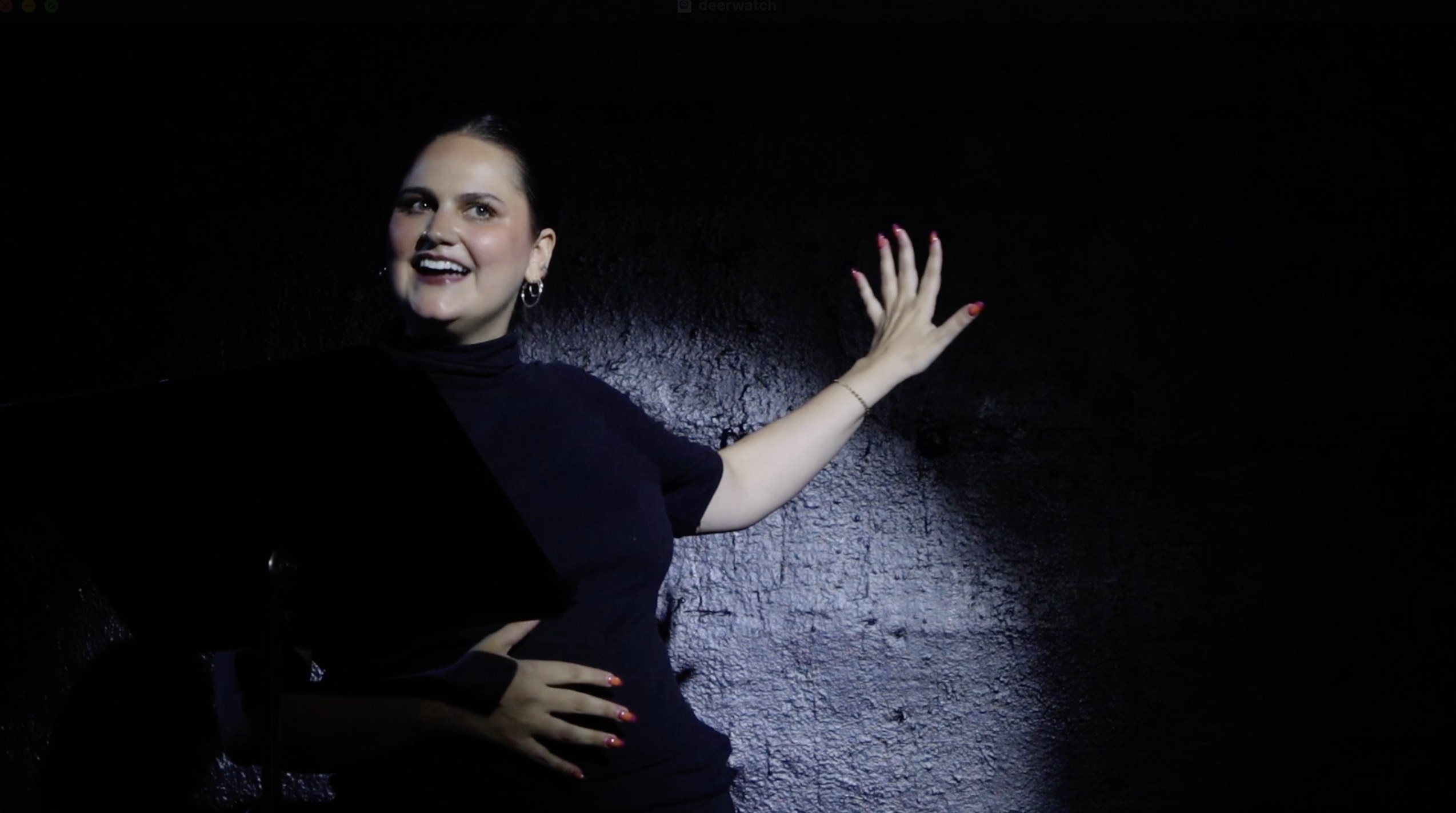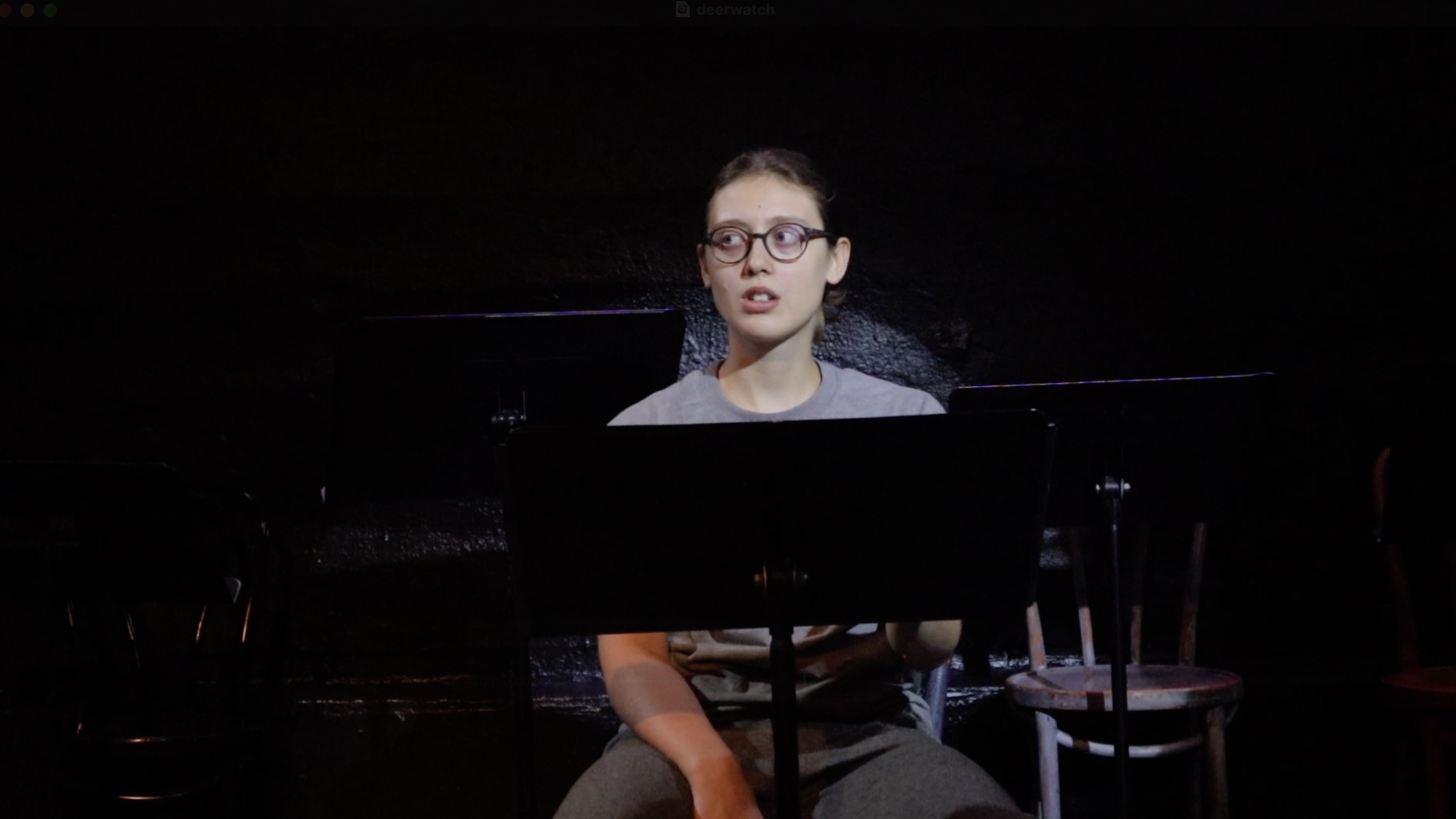
Joe Schwalb as “Scott” and Claire Tumey as “Elyse.” All images by Kitty Richardson.
The future is near, but also far…but also maybe never coming?
Deerwatch, A new play by claire tumey, gives a dystopian tomorrow a familiar face.
By Ciaran Short
8.11.2025
Deerwatch is an experimental play that materializes and satirizes the inescapable existential dread pervading popular imagination, conversations, and mainstream media. Books and films set in post-apocalyptic societies and dystopian futures have been a mainstay for generations, exemplifying a deep fascination with the perceived “end of times.” Turning the viewer’s anxiety into an active participant in the narrative structure of the play, Deerwatch eliminates the distance of tomorrow’s catastrophe by directly addressing the paths society may take toward mass extinction and global calamity, offering realistic optimism in the fact that our impending doom is a shared endeavor.
By grounding lofty and surreal scenarios in the subtle interactions between relatable characters, Deerwatch gives a dystopian tomorrow a familiar face. Although the play is set slightly in the future, the members of the deteriorating polycule that serve as the initial protagonists embody a familiar sense of Millennial and Gen Z angst about finding purpose and meaning in life. Although the world around them is seemingly burning down, they are still most focused on settling scores, asserting dominance in interpersonal relationships, and rehashing circular arguments. The centering of self in the face of insurmountable strife and chaos feels particularly poignant as inequity has rarely felt so palpable in our current reality.
 Michelle Kariuki as “Roberts” and Braden Wilkerson as “Benson.”
Michelle Kariuki as “Roberts” and Braden Wilkerson as “Benson.”
Deerwatch is set in a rural environment that, as a New Yorker, I assumed to be Upstate New York, because anywhere that’s not “The City,” Westchester, or Long Island is, therefore, Upstate. One of the few things that both lifelong New Yorkers and transplants can agree on is that Upstate New York is objectively beautiful and the perfect oasis when one feels overstimulated and bogged down by the dense and hectic energy of “The City.” A house with multiple bedrooms and bathrooms that sits atop enough land to have a porch and a yard feels inaccessible yet excitedly indulgent. In Deerwatch, situating the New York archetypes of Elyse (Claire Tumey), George (Sammy Pignalosa), Scott (Joe Schwalb), and Yara (Lena Iacobucci) in a house symbolizes their removal from the harsh truths of the real world and allows them to indulge in their own desires and impulses free from the critical context of their own privilege. This concept of home as refuge aptly extends to the allegorical representation of America. Capitalism’s alluring promise of social mobility has dwarfed America’s long history of oppression and inequality, cementing the country as a representation of freedom and opportunity for many seeking a better life abroad. Similarly, the perceived protections of home and country only extend as far as one’s own imagination and willingness to turn a blind eye.
The final act of the play shifts focus to Cora (Kate Parker-Lentz), who is the child of Elyse and George and the glue that maintains the waning relationship between the two couples, as Scott and Yara have ventured Upstate to celebrate Cora’s birthday. Cora begins the play as a seemingly silent observer to the adults' dysfunction, but the audience later learns that the events of the play are rooted in Cora’s memories. As an outside observer, the trauma and chaos they are reliving is evident, yet they choose to remain in a cycle of reminiscing rather than venturing forward into an unknown future. The comfort they find in the past reflects upon a growing nostalgia that is apparent across ages, political divides, and sociopolitical classes as teenagers born in the 2000s dress like 90s rockstars, social media influencers cosplay as 1950s housewives, and politicians seek to roll back civil liberties for everyone who isn’t a cis-het white man. By looking backwards, one doesn’t need to acknowledge what stands before them, and, in rather dire situations, to even contemplate the future feels like a privilege.
 Sammy Pignalosa as “George” and Lena Iacobucci as “Yara.”
Sammy Pignalosa as “George” and Lena Iacobucci as “Yara.”
Seminal works that explore societal collapse like 1984, Parable of the Sower, and even The Bible’s Book of Revelation detail a rather bleak and frightening destiny for the human race; despite these texts’ status as canonical literature, many Western countries regard them as simply fictional stories that could never actually come true. However, what the biting dialogue and overarching story structure of Deerwatch exposes is that the wider world has been perpetually facing issues of oppressive fascist regimes, natural disasters, and widespread famine, and Americans engorged with comfort and access are only taking interest now because they must face the looming reality of what they once deemed mere cautionary tales.
Deerwatch establishes a post-COVID America fraught with paranoia and a yearning for simpler times as the sprawling, rhizomatic narrative structure mirrors that of an internet conspiracy theory with a never-ending set of rabbit holes and trap doors rigged to distort reality. Elyse, Cora’s biological mother and the linchpin of the aforementioned polycule, represents the stark dichotomy of existence in attempting to come to terms with a renegotiation of stakes in America. Over the course of the play, Elyse must simultaneously contemplate bodily autonomy when considering a back-alley abortion, generational trauma when deciding who she wants to co-parent her child with, and ego death when grappling with the inevitable failure of her bespoke dog harness company. By keeping levity within sight even in its most heart-wrenching moments, Deerwatch offers a hyperrealistic view of what the end of the world might look like and a sobering reminder that, even in the end of times, we still won't be able to escape the personal trappings of our daily lives.

 Top: Braden Wilkerson as “Benson.” Bottom: Kate Parker-Lentz as “Cora.”
Top: Braden Wilkerson as “Benson.” Bottom: Kate Parker-Lentz as “Cora.”Deerwatch is a play written and produced by Claire Tumey with direction by Hannah Bird and dramaturgy by June Buck.
